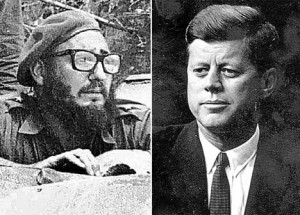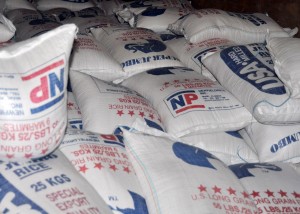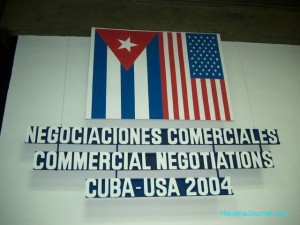Hidden Trade – The U.S. Embargo and Corporate Privilege
April 21, 2012 by admin
Most Americans seem to know about the U.S. embargo on trade with Cuba because it prevents them from buying or importing Cuban cigars. However, the embargo (known in Cuba as “el bloqueo” or “the blockade”) affects much more than the sale of tobacco and has a significant impact on daily life in Cuba, restricting Cubans’ access to many U.S.-made products, such as pharmaceuticals, electronics and even basic consumer goods like soap. Nonetheless, what many people don’t realize is that the embargo has never really completely stopped trade, at least in terms of the sale of U.S. goods to Cuba. Over the 50 years the embargo has been in place, U.S. corporations have consistently found or created loopholes and exceptions in the embargo in order to continue selling certain items, particularly food and agricultural products, in Cuba. The result is an “embargo” that is, in reality, hiding a massive one-way trade that last year (2011) amounted to $352 million worth of U.S. exports to the island.[1]
A Brief History of the Embargo
Beginning in 1960, the U.S. government enacted a series of increasingly harsh measures designed to end trade with Cuba. These policies were developed in an attempt to economically undermine the Cuban government, which had nationalized U.S. owned land and business interests and allied itself with the Soviet Union. While travel to and from the island was almost completely restricted and U.S. citizens were not allowed to purchase Cuban goods, American corporations were still able to conduct business in Cuba because the embargo did not prohibit them from selling goods in Cuba through their foreign subsidiaries. For example, between 1980 and 1992, the U.S. government allowed U.S. owned subsidiaries in foreign countries to engage in trade with Cuba that was valued at over $4.563 billion.[2]
However, when Cuba lost the economic support after the collapse of the Soviet Union, the U.S. decided to increase the economic pressure on the Cuban government and put a harsher version of the embargo – which had previously existed only as a collection of executive orders issued by various presidents – into law. The so-called Toricelli Act of 1992 and the Helms-Burton Act of 1996 made it illegal even for U.S. subsidiaries in other countries to conduct business with Cuba and even mandated that products made by non-U.S. owned companies that contained more than 10% U.S. material could not be sold there. These laws effectively ended the large-scale trade U.S. companies had conducted with Cuba through other countries.
The Current State of U.S.-Cuba Trade
But U.S. companies persevered and in 2000, President Clinton signed into law an exception to the embargo that allows certain U.S. businesses, primarily agriculture and food companies, to sell products, such as corn and rice, to Cuba.[3] These sales were completely unaffected by President George W. Bush’s otherwise aggressive moves to tighten the embargo and actually reached their peak in 2008, when the U.S. exported $711.5 million worth of agricultural products to Cuba, which had seen reduced crop yields due to severe hurricanes.[4] Since then, the total exports have declined and seem to have leveled off at between $300 and $400 million a year.
On the Cuban side, trade with the U.S. is handled by a single government entity known as Alimport.[5] Basically, when a Cuban group or government entity needs a product from the U.S., they tell Alimport, which alerts U.S. corporations of a particular order and then accepts bids from the corporations, chooses which company to buy from and pays up front in cash for the goods. The U.S. government must then approve all individual sales before they can be delivered to Cuba, which exempts U.S. ships from the rule that prevents vessels that have docked in a Cuban port from returning to the U.S. for six months.
Still, the question remains: what do all these technical arrangements to allow one-way trade really mean? While U.S. agricultural sales do allow Cuba to purchase relatively low-priced food in times of need, the fact that the U.S. government has consistently been willing to provide large-scale exemptions to the embargo only to corporations seems to highlight the fact that the embargo is useful to the U.S. government primarily as a show of political force designed to win over Cuban exile voters. As long as sales to Cuba are kept out of the public eye, either by being routed through foreign countries or restricted to specific industries, the U.S. government sets aside its policies on Cuba in the interest of profit.
[1] U.S. Census Bureau, “2011: U.S. trade in goods with Cuba”
http://www.census.gov/foreign-trade/balance/c2390.html
[2] U.S.-Cuba Trade and Economic Council, Inc, “Realities of MarketCuba,”http://www.cubatrade.org/market.html.
[3] Stephanie Hanson, “U.S. Cuba Relations.”
http://www.cfr.org/cuba/us-cuba-relations/p11113
[4] U.S. Census Bureau, “2011: U.S. trade in goods with Cuba”
http://www.census.gov/foreign-trade/balance/c2390.html
[5] U.S. Department of Agriculture, “Cuba’s Food and Agriculture Situation Report (2008),” 26.
www.fas.usda.gov/itp/cuba/cubasituation0308.pdf
Leave a Reply
You must be logged in to post a comment.


